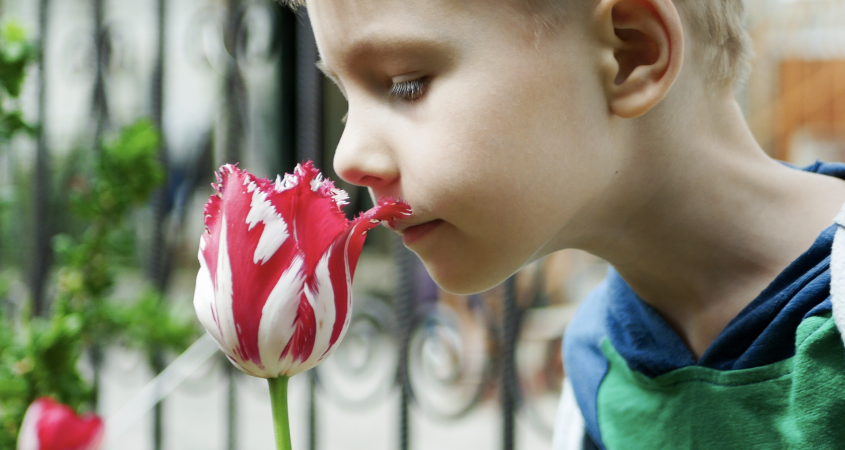The impact of grief on our senses
As part of the animal kingdom, we are dependent from birth on sensory stimulation to ensure survival, growth and well-being. Impairment of any of our senses – sight, sound, touch, taste and smell – requires an ability to adapt and may mean that remaining senses work harder to accommodate absence or deficiency.
In our lifetime, many things will have an impact on one or more of our senses. Most of us are familiar with the effect of accidents, abuse, illness, aging, drugs, viruses, trauma, neglect, environmental hazards and genetic vulnerability on any of these.
Grief is probably less well known or understood as an experience that can impact any or all of our senses. When grief is new and very raw, our senses tend to be on alert, poised for fight, flight or freeze, and react as if light and colours are ‘too’ bright, sounds too loud, smells too strong, food is tasteless and generally unappealing, and the lightest touch, however caring, can hurt skin that feels hypersensitive. If trauma is part of our grief experience the sensory effect is likely to be more pronounced and may necessitate the need for specialized attention.
For most of us there are many things we can do to ‘self soothe’, but first, it’s helpful to acknowledge that our sensory responses, however uncomfortable, are working in our service as it were. They may force us to slow down, to find a safe place in which to metaphorically ‘lick our wounds’, and in so doing, enable us to take the time necessary to acknowledge and adapt to the changed world in which we find ourselves.
As you began your journey with grief, which sense was most affected? The answer to that question will probably provide the best starting point for self-soothing. Mine was sight and sound, both affected by tears; yours may be one or all of your senses. For the sake of this exercise, I’ll address each sense in familiar order with simple suggestions which may help if the distress you are experiencing is relatively mild. If trauma and its effects are more severe, it’s advisable to see someone who specializes in this field of counselling.
Sight
Our eyes may be inflamed and eyelids puffy if we’ve shed a lot of tears, or uncomfortable with a feeling of pressure if we haven’t cried.
Familiar strategies like wearing sunglasses while outside, cold pads while resting, silk eye masks and lubricating eye drops at night can soothe and help us to sleep, even if only for short periods.
If flashbacks to distressing images cause distress, resist the temptation to fight them. Let them be for a few moments, then replace them with images that are soothing or reminders of happier times. For example, I replace images of my daughter lying in her coffin with photos of her as a baby, a beautiful child, and a happy young adult. I also find places where I can focus on nature – trees, flowers, water, birds and animals. Find images that work for you until you feel confident you can make distressing images background for most of the time.
Sound
Some people’s hearing may be temporarily impaired because tears have blocked the Eustachian tubes. For others, external sound may seem extra loud, and for still others, consist of internal, repetitive flashbacks to sounds associated with the illness, dying, or death of the loved person. Flashback sounds may be stimulated by hearing someone moaning, screaming or gasping. For others, ambulance, fire engine or police sirens can leave a lifelong impact. Special music can also have that instant effect.
Once again, don’t fight your reaction. Stay with it for a few moments, then, when possible, use a sound that you find calming or uplifting to change foreground and background. Keep ear pods handy so you can listen to a podcast, an audio book or a playlist that only has happy reminders of the person you grieve.
Touch
Some folk find familiar touch like a hug, a massage, or holding hands comforting, while others experience the reverse. Intimate touch may feel threatening for some, needed by others. There is no right or wrong, we all need to do what fits for us.
If your skin is hypersensitive, non-threatening touches like the feel of a soft breeze, small doses of sunshine on bare skin at safe times of day, or a warm or cold shower can help restore us to our previous normal. Another way of re-entering the world of touch might be to give, rather than receive touching. For example, running your hands over satin or velvet, or patting the fur of a dog or cat. Men, and some women, may prefer the feel of using machinery, washing the car, swimming, catching or hitting a ball, or feeling sweat on their skin as they workout at the gym. Cooking, sewing or gardening works better for others. Let yourself be aware of what you are feeling as you re-enter the world of touch.
Taste
Grief often has a pronounced effect on digestion and tends to suppress appetite for many and increase it for others.
Comfort eating, or drinking, might be fine for a short period but can create further problems if prolonged. On the other hand, finding food unappealing is also fine for a short period. If that’s the case, eat food that is soft and easy to digest. Bereavement counselling, a chat with a dietitian or a google search for food that can soothe stress might help you get your eating back on track.
Smell
Smell is evocative and can bring memories back into foreground in an instant. I remember travelling on a bus many years after my father died and the sudden smell of a man’s aftershave produced an instant flood of tears.
Many folk find hospital smells difficult, or any smell associated with the life, dying or death of the person they love. If that’s the case, it can help to wear, carry with you, or fill your home with something that has a smell associated with happy times.
Taking control – living with grief
The impact of grief can make us all feel temporarily out of control, as if life itself is out of control. Any steps we take, however simple or small, to manage our reactions, our hypersensitivity, is a reminder that there are aspects of our life still within our control. Every small success can feel empowering.
I wrote the simple poem below to express my own experience. Yours may be similar or very different.
Recovering from grief is like waking after a long hibernation
to feel…the warmth of the sun…to hear…the soft hum of bees,
the songs of birds; to smell the perfume of flowers…to taste…the salt of my tears…to let the beauty of nature caress my senses, to know…
the grandeur of mountains…to experience…the stillness within me
as a haven from pain.
If you are grieving and are concerned about feeling hypersensitive, please reach out to the team at the NCCG by phone 1300 654 556, email [email protected] or use their free email outreach service at [email protected]. They are specialists in caring for both adults and children of all ages 3 and older impacted by grief and bereavement.
An NCCG Blog
By Dianne McKissock OAM
Co-founder, National Centre for Childhood Grief
February 2023






